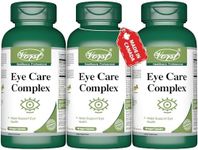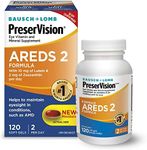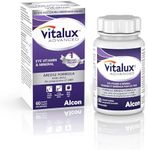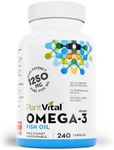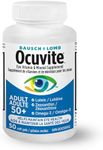Buying Guide for the Best Eye Supplements
Choosing the right eye supplement can be a great way to support your eye health, especially if you have specific concerns like dry eyes, age-related changes, or spend a lot of time in front of screens. The key is to understand what ingredients and formulations are most beneficial for your needs, and to be aware of how different supplements can target different aspects of eye health. Always remember that supplements should complement a healthy lifestyle and not replace a balanced diet or professional medical advice.Key IngredientsThe most important aspect of any eye supplement is its list of active ingredients. Common ingredients include lutein, zeaxanthin, vitamin A, vitamin C, vitamin E, zinc, and omega-3 fatty acids. These nutrients are known to support various aspects of eye health, such as protecting against blue light, supporting night vision, and reducing the risk of age-related eye conditions. When comparing supplements, look for those that contain a combination of these ingredients, as they often work best together. If you have a specific concern, like dry eyes or macular health, focus on supplements that highlight the relevant nutrients.
Dosage and ConcentrationDosage refers to the amount of each nutrient provided in a single serving of the supplement. This is important because too little may not be effective, while too much could cause side effects. Supplements often list the amount of each vitamin or mineral in milligrams (mg) or international units (IU). Compare these values to recommended daily allowances or guidelines from reputable health organizations. If you have dietary restrictions or are already taking other supplements, make sure the total intake of each nutrient stays within safe limits.
Form of SupplementEye supplements come in various forms, such as capsules, softgels, tablets, gummies, or even liquid drops. The form can affect how easy the supplement is to take and how well your body absorbs the nutrients. For example, softgels and liquids may be easier to swallow and digest, while gummies can be more appealing if you dislike pills. Choose a form that fits your preferences and lifestyle, as consistency is key to seeing benefits.
Purity and AdditivesSome supplements contain fillers, artificial colors, or preservatives that may not be necessary and could cause reactions in sensitive individuals. Check the ingredient list for unnecessary additives, especially if you have allergies or sensitivities. Look for products that are labeled as free from common allergens like gluten, dairy, or soy if that is important to you. Purity can also refer to third-party testing or certifications, which can give you confidence in the quality of the supplement.
Intended Use or Target AudienceSome eye supplements are formulated for specific groups, such as older adults, people with a family history of eye conditions, or those who spend a lot of time on digital devices. The intended use can guide you toward a product that matches your needs. For example, if you are concerned about age-related macular degeneration, look for supplements that follow research-backed formulas. If you want general support for screen use, focus on those with lutein and zeaxanthin.



